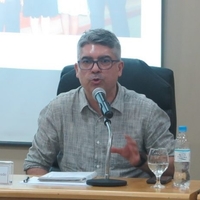
James Hawdon
Related Authors
Renzo Taddei
Universidade Federal de São Paulo (UNIFESP)
Naim Kapucu
University of Central Florida
David Seamon
Kansas State University
Armando Marques-Guedes
UNL - New University of Lisbon
Noe Cornago
University of the Basque Country, Euskal Herriko Unibertsitatea
Manuel Tironi
Pontificia Universidad Catolica de Chile
Edward Simpson
SOAS University of London
Uday Chandra
SFS Qatar (Georgetown University)
Andres Antillano
Universidad Central de Venezuela
Rodrigo G de Azevedo
Pontifícia Universidade Católica do Rio Grande do Sul










Uploads
Papers by James Hawdon
decrease the likelihood of PTSD and other health problems after traumatic events. However, little research investigates if social solidarity influences wellbeing independent from the social support
that accompanies heightened solidarity. That is, does feeling attached to a group protect one from negative events even if social support is lacking? We investigate the relationship between
solidarity and wellbeing after tragedies by analyzing three mass shootings: a mall shooting in Omaha, Nebraska and two school shootings in Finland. Our results indicate that social solidarity
decreases depressive symptomology in all three cases and promotes wellbeing in both the short and long-term. The influence of solidarity on wellbeing remains even when controlling for other
known predictors of depression, including social support. Therefore, solidarity’s influence on wellbeing appears to be substantial and enduring. Importantly, our research also demonstrates that the relationship between solidarity and wellbeing holds across cultures.
decrease the likelihood of PTSD and other health problems after traumatic events. However, little research investigates if social solidarity influences wellbeing independent from the social support
that accompanies heightened solidarity. That is, does feeling attached to a group protect one from negative events even if social support is lacking? We investigate the relationship between
solidarity and wellbeing after tragedies by analyzing three mass shootings: a mall shooting in Omaha, Nebraska and two school shootings in Finland. Our results indicate that social solidarity
decreases depressive symptomology in all three cases and promotes wellbeing in both the short and long-term. The influence of solidarity on wellbeing remains even when controlling for other
known predictors of depression, including social support. Therefore, solidarity’s influence on wellbeing appears to be substantial and enduring. Importantly, our research also demonstrates that the relationship between solidarity and wellbeing holds across cultures.